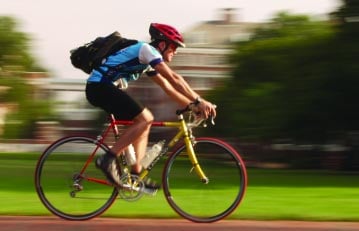That Spandex blur is Scott Burkholder ’02, speeding from engineering to oncology research.

To say that Scott Burkholder ’02 is on a roll would not only be a pretty bad pun, it would also be a gross understatement. The chemical and biomedical engineering double major—who now works as lab technician conducting oncology research at the Johns Hopkins School of Medicine—is also a nationally competitive bicyclist.
Basic science is not the traditional career path of a trained engineer. But then, Burkholder has never been much of a traditionalist. The Alexandria, Minnesota, native picked Hopkins in the first place because, as a high school student, he knew he wanted to go into some kind of medically related engineering. He just wasn’t sure which kind. “The fact is,” he says, “I could not decide between chemical and biomedical engineering.” Hopkins was one place he could do both in four years. “And at that point I wasn’t even aware of Hopkins’ reputation in biomedical engineering,” he says.
Then, as a freshman, he was looking for a job. “The best wage for my level of experience was in the Transgenic Core Laboratory” at the School of Medicine. As an animal technician there, “cleaning cages and stuff,” he got his first look genetic research. “The Transgenic Core Laboratory is really a service lab,” Burkholder explains. Researchers involved in various genetic research projects contract with the lab, located in the Wood Basic Science Building in East Baltimore, to produce transgenic mice. Much of the genetic research supported by the lab is directed to the study of cancer.
During his second year helping at the lab, Burkholder started to do more technical work. The sophomore was also learning more about the oncology research in which many of the Hopkins scientists were engaged. “I have a keen interest in genetics,” he says, “and a big field that uses genetics is oncology.” That led to his decision to conduct basic science research after graduation.
Then, in his junior year, he got a mountain bike, and things really began getting interesting. For the busy undergraduate—whose time was now split between studying for a double major, working in a lab on the other side of town, and participating in campus ministry, not to mention chairing a committee for the Johns Hopkins Model United Nations Conference—biking became yet another passion. “The closest place to the Homewood campus for trail riding is at least four and a half miles away,” he explains. That means about 20 minutes riding each way, just to get to the single-track dirt paths and challenging courses that serious mountain bikers crave. “Summers weren’t so tough, because it stays light longer,” he says. But on some days, he’d have to ride straight to class, where he would grab his seat and start taking notes, still dressed in mud-spattered biking shoes, Spandex shorts, and bright riding jersey.
The bike also became a commuting machine. “My best time from Homewood to Wood Basic Science is 10 minutes, 18 seconds,” he boasts. “That’s faster than the shuttle.” His route down into the urban core of East Baltimore could be as challenging as the dirt tracks of Robert E. Lee Park in the northern part of the city, but the ride was exhilarating— and great exercise. When a security officer at Wood suggested Scott limit his riding to daylight hours, he decided he’d take the shuttle…sometimes. And it was on that shuttle that he met David Neil Watkins, an Australian researcher working at the School of Medicine. “I’m the kind of guy who likes to strike up a conversation,” says Burkholder. The two talked about genetics, oncology, and the Minnesota Vikings. They hit it off right away.
Through another fortunate turn of events, Watkins, who originally intended to return to his home country after completing a research project in Baltimore, was hired as a member of the Hopkins Medicine faculty. He’s now Burkholder’s boss at the cancer lab.
Burkholder views his engineering background as a boon to his new career in research. “As a basic scientist, you are geared toward absorbing knowledge,” he says. “As an engineer, you learn how to get the knowledge to solve problems. These problemsolving skills are extremely valuable in basic research. My path as an engineer is different from most, and I think in some ways it should be encouraged. The tools you gain as an engineer are so applicable and practical.”
As for bicycling? “I’d love to get to France to experience the Tour de France first-hand,” Burkholder says. He also intends to continue competitive cycling, as a secondary passion. “Right now, I’m just loving riding and learning how to ride. I would love to see how far I can go with it.” If experience is any indicator, he’ll go far.




